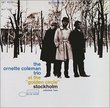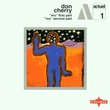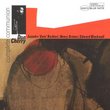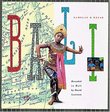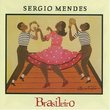| All Artists: Don Cherry Title: Symphony for Improvisers Members Wishing: 3 Total Copies: 0 Label: Blue Note Records Original Release Date: 1/1/2005 Re-Release Date: 7/19/2005 Album Type: Original recording remastered Genres: Jazz, Pop Style: Avant Garde & Free Jazz Number of Discs: 1 SwapaCD Credits: 1 UPC: 724356382329 |
Search - Don Cherry :: Symphony for Improvisers
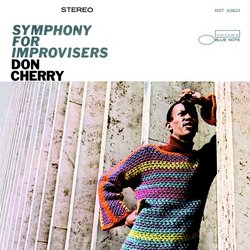 | Don Cherry Symphony for Improvisers Genres: Jazz, Pop
In 1966, Don Cherry was leading a New York quartet with Pharoah Sanders and a European quintet with Gato Barbieri. For his second Blue Note album, he decided to combine these two bands into a Symphony For Improvisers. DON... more » |
Larger Image |
CD DetailsSynopsis
Album Description In 1966, Don Cherry was leading a New York quartet with Pharoah Sanders and a European quintet with Gato Barbieri. For his second Blue Note album, he decided to combine these two bands into a Symphony For Improvisers. DON CHERRY, cornet GATO BARBIERI, tenor sax PHAROAH SANDERS, tenor sax, piccolo KARL BERGER, vibes, piano HENRY GRIMES, JEAN-FRANCOIS JENNY CLARK, basses EDWARD BLACKWELL, drums Similar CDs
Similarly Requested CDs
|
CD ReviewsDon Cherry starts finding his own voice. Michael Stack | North Chelmsford, MA USA | 08/01/2005 (5 out of 5 stars) "In 1966, Don Cherry was finally stepping into his own as a band leader. Whereas Cherry's mentor Ornette Coleman had what many New York musicians felt was no pedigree, Cherry was a journeyman of free jazz, having spent several years with Coleman, recorded an album with John Coltrane, toured with Sonny Rollins, blew horn opposite Archie Shepp in the New York Contemporary Five, and played Europe with Albert Ayler. Along the way, Cherry also led bands in the U.S. with a young tenor sax player named Pharoah Sanders, bassist Henry Grimes, and drummer Ed Blackwell, discovered Argentinian Gato Barbieri in Europe, laid down an album with Barbieri, Grimes, and Blackwell ("Complete Communion"), then took off back to Europe with Barbieri, where he gigged with, among others, German pianist Karl Berger and French bassist Jean-Francois Jenny-Clark. Cherry brought Jenny-Clark, Berger, and Barbieri back to the studio in New York to augment the band he'd left behind there (Sanders, Grimes, and Blackwell). The result is two suites-- "Symphony for Improvisers" and "Manhattan Cry", both released under the former title. The first suite, "Symphony for Improvisers", feels triumphant in the way a march does, or perpaps in the way Ayler's music does, with swelling, explosive themes. Sanders plays on piccolo throughout, weaving in and out of the other the two horns and Berger (who is featured on vibes). Cherry and Berger play wonderfully, trading solos on the second movement ("Nu Creative Love"), but its Blackwell who steals the show, with his incomparable accompaniment and eventual solo space in the funky third movement and the fourth. In this last movement ("Infant Happiness") is some of Blackwell's finest playing, with a delicate solo playing against space-- Blackwell was a man who understood that even if polyrhythmic playing, space can often be as valuable unfilled as filled. The second suite, "Manhattan Cry", is a bit more sparse in its form. This is probably most obvious as the Barbieri and Sanders are not heard together at all-- Blackwell's superb drum solo (a trend on this album) marks the point where Barbieri stops playing and Sanders starts. But throughout, there's a bit more variety of form on these pieces-- from the opening movements delicate and beautiful theme (and soloing) with a traditional form of horn, piano, bass, and drums to Sanders' searing solo on the third movement. The piece in general though is a bit less rewarding then "Symphony for Improvisers". Its interesting that Cherry chose to include two bassists on this session as, like the tenor sax, only one bass is ever heard at a time and the two switch off during both pieces. Likewise while the roll of both Sanders and Barbieri is clear on "Symphony for Improvisers", I wonder why Cherry didn't have one of them layout altogether rather than switching horns midway through. The reissue is remastered by Rudy Van Gelder, original engineer for the sessions. Sonically, its nearly flawless, and while the previous issue sounded awfully good too (I haven't done a side-by-side comparison), it hasn't been in print and ages and this is a welcome return. The original liner notes are included as is a new essay by Bob Blumenthal. In the end, this material is very satisfying, and I've often felt this record, even with its odd shifts in active musicians, is the best of Cherry's Blue Note work. And while the influence of Coleman and Ayler is still pretty heavy on this, Cherry's identity is starting to come through. Its also quite interesting to hear Pharoah Sanders before he hooked up with Coltrane. For both historical and intrinsic value, this recording is recomended." If there's a better Don Cherry album, I haven't heard it Peter E. Johansen | 03/27/2006 (5 out of 5 stars) "There is just as much emphasis on melody here as free jazz fury, though with Gato Barbieri and Pharoah Sanders playing tenor there is the passionate disonance here that one might expect, though honestly they seem to be playing with more restraint than might be expected given other recordings they played on circa 1966. Comprised of two rather long compositions (both approach 20 minutes), my first thought is that this is one of those jazz albums where everything just fits together beautifully. This album is really carried by Don Cherry's trumpet and Ed Blackwell's drumming, and both players seem to display an almost superhuman amount of propulsive energy. In addition to the tenor, Pharoah Sanders also plays the piccolo on this date, which he does with so much grace that I would hold this up to a Pharoah Sanders detractor - and there seem to be a lot of these - as an example of just how versatile and intelligent an improviser he is. Finally, Karl Berger, who mostly plays vibes here and is someone I know little about, sounds as if he's really listening to the other musicians as he compliments what they are doing with minimalist precision. I have the same thought as one of other reviewers (Michael Stack) about questioning why there are even two bass players on here since I think they just play one at a time. With these players I expected to hear some murky two bass interaction as on Coltrane's Ole or Ayler's Live at Greenwich Village, but that doesn't happen here. Yet still, this is hardly even something to complain about since there's certainly enough happening overall to feel very enthusiastic about this album, and at least to my ears right now, it seems that the sound quality might be even better than the typically high standards for the RVG remasters; each of these improvisers - all in there prime - comes through with such sonic precision that I'm confident this is a CD I will come back to many times." Contemporary then, and now... Michael Maiman | San Mateo, CA United States | 02/21/2006 (5 out of 5 stars) "An outstanding array of musicians. Like a frame around a painting, the hard driving rhythm section and the themes (yes, there are melodies) frame the hard-driving, sometimes screaming and screeching Pharoah Sanders and--Gato Barbieri (heard on "smooth jazz" radio stations)! It's a production in which you will hear a little more each time you listen to it...isn't that what we ask for in music? Well, some of us do. I have little to add to the other excellent review, so, just buy it and share it with someone who thinks that jazz should be (ugh) "smooth!""
|

 Track Listings (2) - Disc #1
Track Listings (2) - Disc #1